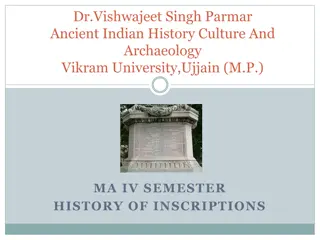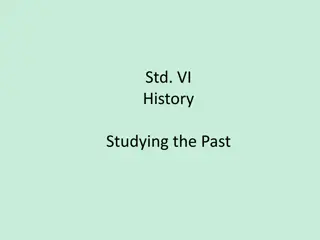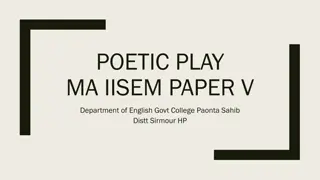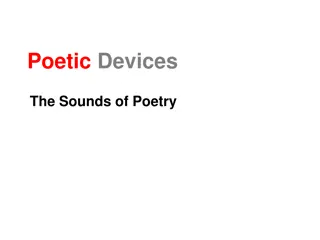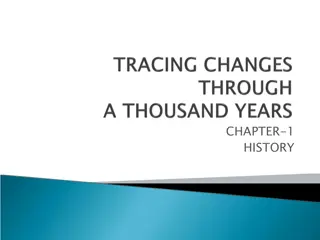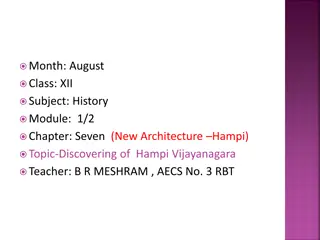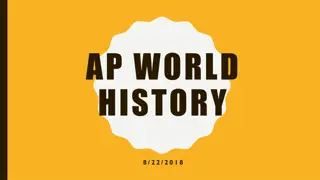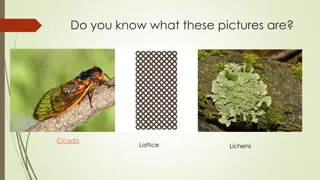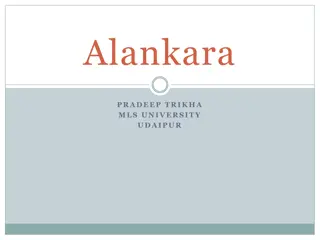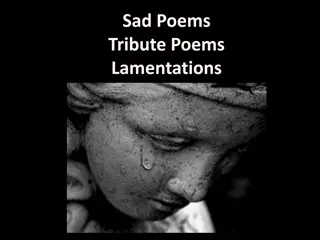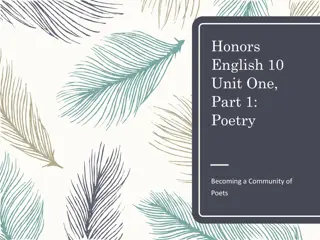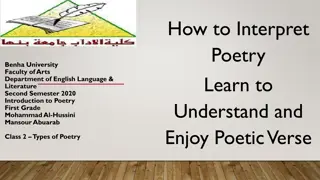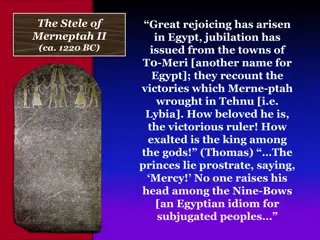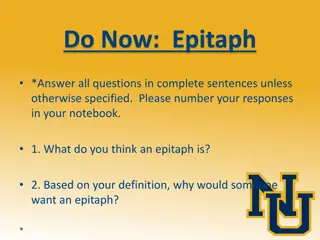Inscriptions in Words: A Collection of Poetic and Historical Epitaphs
Explore a captivating compilation of inscriptions, ranging from poetic verses by renowned writers like John Donne and William Wordsworth to historical Roman epitaphs. Immerse yourself in the beauty of language and the depth of meaning conveyed through these inscriptions etched in time.
Download Presentation

Please find below an Image/Link to download the presentation.
The content on the website is provided AS IS for your information and personal use only. It may not be sold, licensed, or shared on other websites without obtaining consent from the author. Download presentation by click this link. If you encounter any issues during the download, it is possible that the publisher has removed the file from their server.
E N D
Presentation Transcript
Poem as Inscription: Ezra Pound to Ian Hamilton Finlay Rowena Fowler University of Warwick 9 March 2019
Roman Epitaph in Hexham Abbey Dis Manibus Flavinus eq(ues) alae Petr(ianae) signifer tur(ma) Candidi an(norum) XXV stip(endiorum) VII h(ic) s(itus) (est) To the Gods and the Shades. Flavinus. Standard-bearer. Petriana Horse. White Troop. Age Twenty-Five. Service Seven. Lies Here.
Hrothgars inscribed sword Hro gar ma elode, hylt sceawode, ealde lafe, on m w s or written fyrngewinnes, sy an flod ofsloh, gifen geotende, giganta cyn . . . Swa w s on m scennum sciran goldes urh runstafas rihte gemearcod, geseted ond ges d hwam t sweord geworht, irena cyst, rest w re, wreo enhilt ond wyrmfah. a se wisa spr c sunu Healfdenes (swigedon ealle): Beowulf, 1687 90; 1694 99
John Donne A Valediction: of my name, in the window I Doth contribute my firmnesse to this glasse, Which, ever since that charme, hath beene As hard, as that which grav d it, was; Thine eye will give it price enough, to mock The diamonds of either rock. My name engrav d herein, II As all-confessing, and through-shine as I, Tis more, that it showes thee to thee, And cleare reflects thee to thine eye. But all such rules, loves magique can undo, Here you see mee, and I am you. Tis much that Glasse should bee
Graffito on window at Jesus College, Cambridge, c. 1600
William Wordsworth Written with a slate Pencil upon a Stone, the largest of a Heap lying near a deserted Quarry, upon one of the Islands at Rydal Stranger! this hillock of mis-shapen stones Is not a Ruin spared or made by time, Nor, as perchance thou rashly deem st, the Cairn Of some old British Chief: tis nothing more Than the rude embryo of a little Dome Or Pleasure-house, once destined to be built Among the birch-trees of this rocky isle. . . . if, disturbed By beautiful conceptions, thou hast hewn Out of the quiet rock the elements Of thy trim Mansion destined soon to blaze In snow-white splendour, think again; and, taught By old Sir William and his quarry, leave Thy fragments to the bramble and the rose; There let the vernal slow-worm sun himself, And let the redbreast hop from stone to stone.
Keatss grave in Rome Here lies One Whose Name was writ in Water
Ezra Pound, Stele (Moeurs contemporaines, VI) After years of continence he hurled himself into a sea of six women. Now, quenched as the brand of Meleager, he lies by the poluphloisboious sea-coast. SISTE VIATOR
Ezra Pounds inscribed oars But thou, O King, I bid remember me, unwept, unburied Heap up mine arms, be tomb by sea-bord, and inscribed: A man of no fortune, and with a name to come. And set my oar up, that I swung mid fellows. (Canto I / 3 4; cf Odyssey 11. 21 78) Then on an oar Read this: I was And I no more exist; Here drifted An hedonist. ( Mauberley , IV)
Under bare Ben Bulbens head In Drumcliff churchyard Yeats is laid. An ancestor was rector there Long years ago; a church stands near, By the road an ancient Cross. No marble, no conventional phrase; On limestone quarried near the spot By his command these words are cut: Cast a cold eye On life, on death, Horseman, pass by! September 4, 1938 (W. B. Yeats, Under Ben Bulben , VI)
Roman tile from Silchester Pertacus Perfidus Pertacus, Perfidus, Campester Lucilianus Campanus conticuere omnes Campester, Lucilianus, Campanus: they all fell silent.
from U.A. Fanthorpe, The Silence They came too near the dark, for all their know-how. Those curses they scratched widdershins on lead Asking for trouble. We withdrew into the old places, that are easier To believe in. Once we waited For someone to come back, But now it s clear they won t. Here we stand, Between Caes. Div. Aug. and the next lot, expert only At unspeakable things, Stranded between history and history, vague in-between people. What we know will not be handed on. Conticuere omnes.
Ian Hamilton Finlay, wood carving Even gods have dwelt in woods Habitarunt di quoque silvas (Virgil, Eclogues 2. 60)
Ian Hamilton Finlay, stone and steel The world has been empty since the Romans
Geoffrey Hill, Sorrel Very common and widely distributed . . . It is called sorrow . . . in some parts of Worcestershire. Memory worsening let it go as rain streams on half-visible clatter of the wind lapsing and rising, that clouds the pond s green mistletoe of spawn, seeps among nettle-beds and rust-brown sorrel, perpetual ivy burrowed by weak light, makes carved shapes crumble: the ill-weathering stone salvation s troth-plight, plumed, of the elect.
Poem as Inscription: Ezra Pound to Ian Hamilton Finlay Rowena Fowler University of Warwick 9 March 2019



